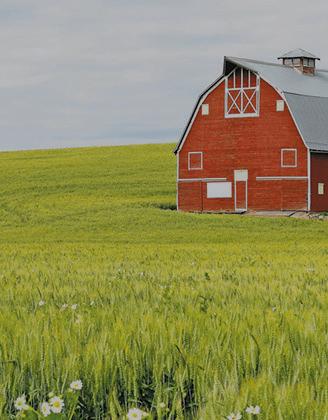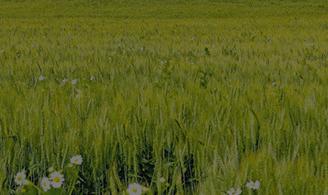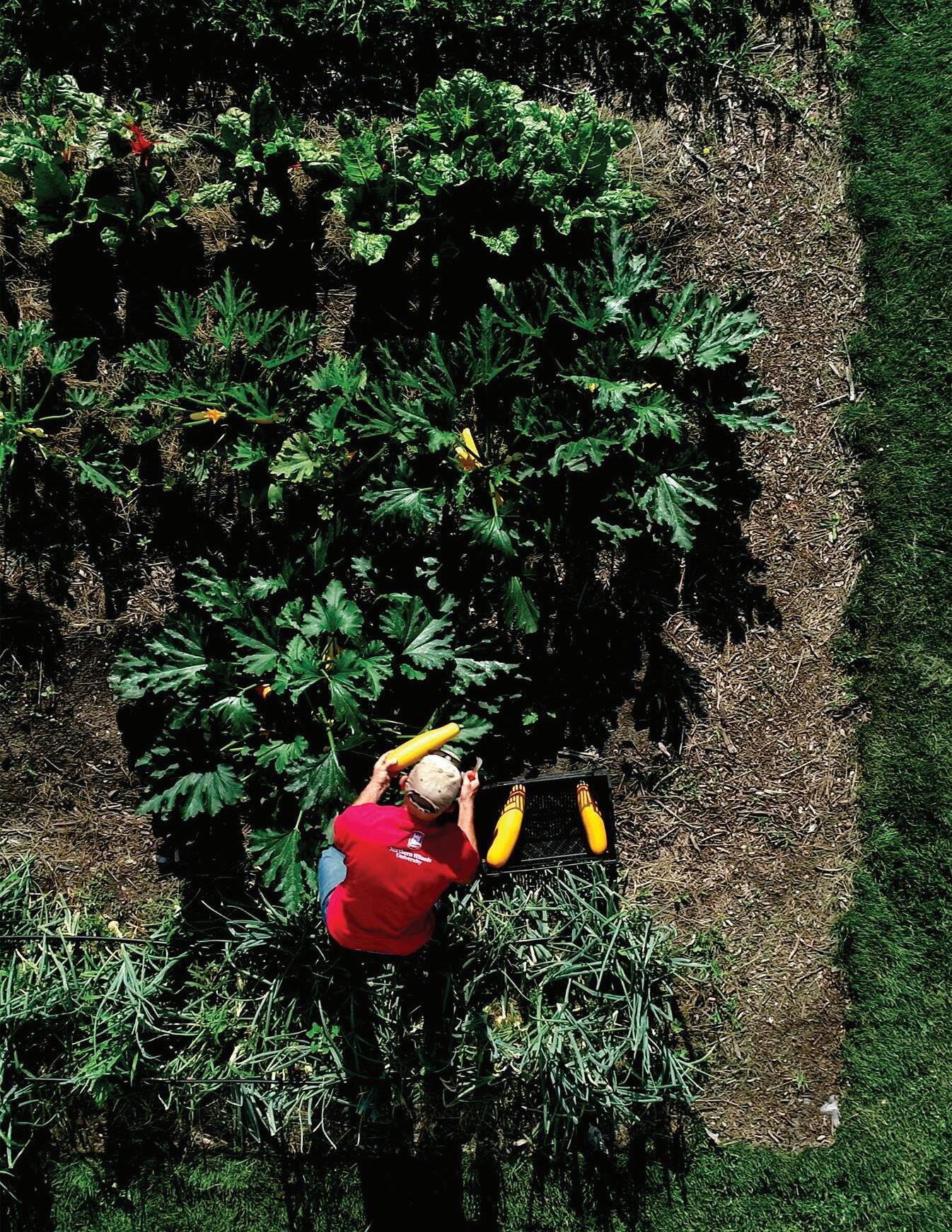







Commitment that’s one of a kind. Agribusiness solutions you trust.
•Digital tools for fast, secure payroll and payments
•Business checking, savings and credit card solutions
•International trade expertise and financial guidance
•Agriculture term loans and open lines of credit



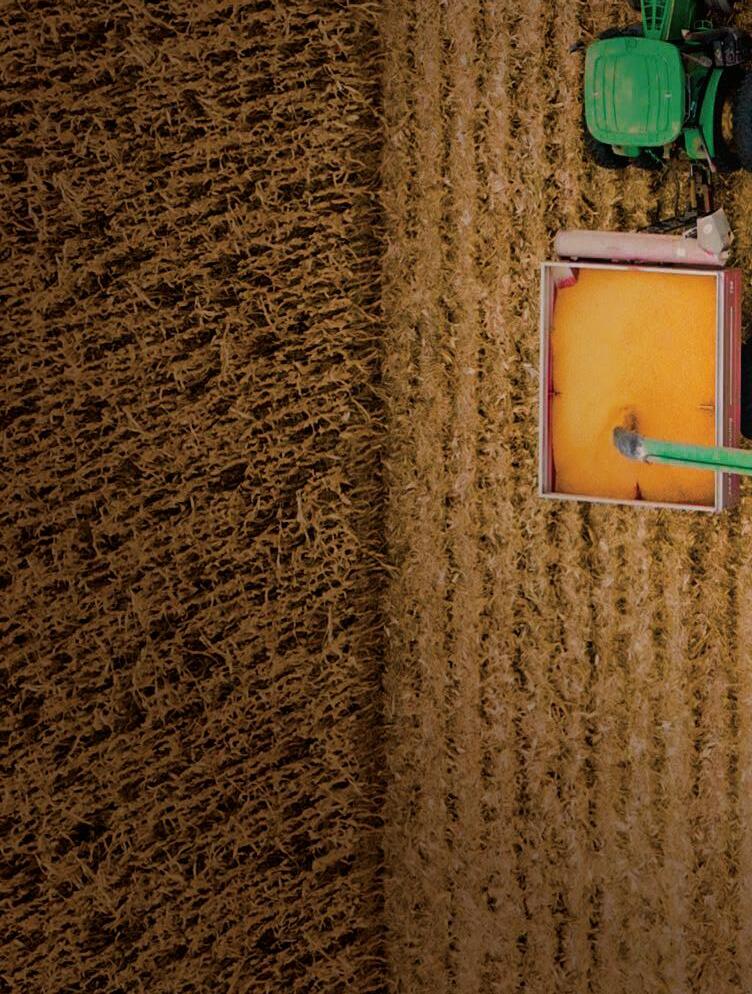


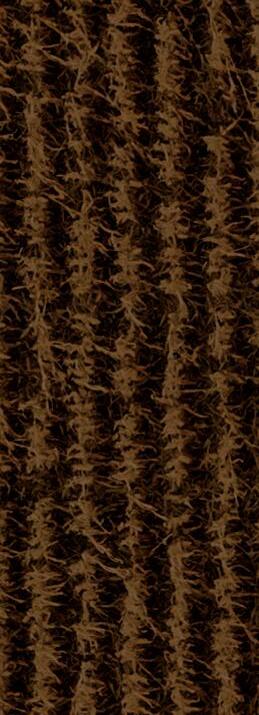

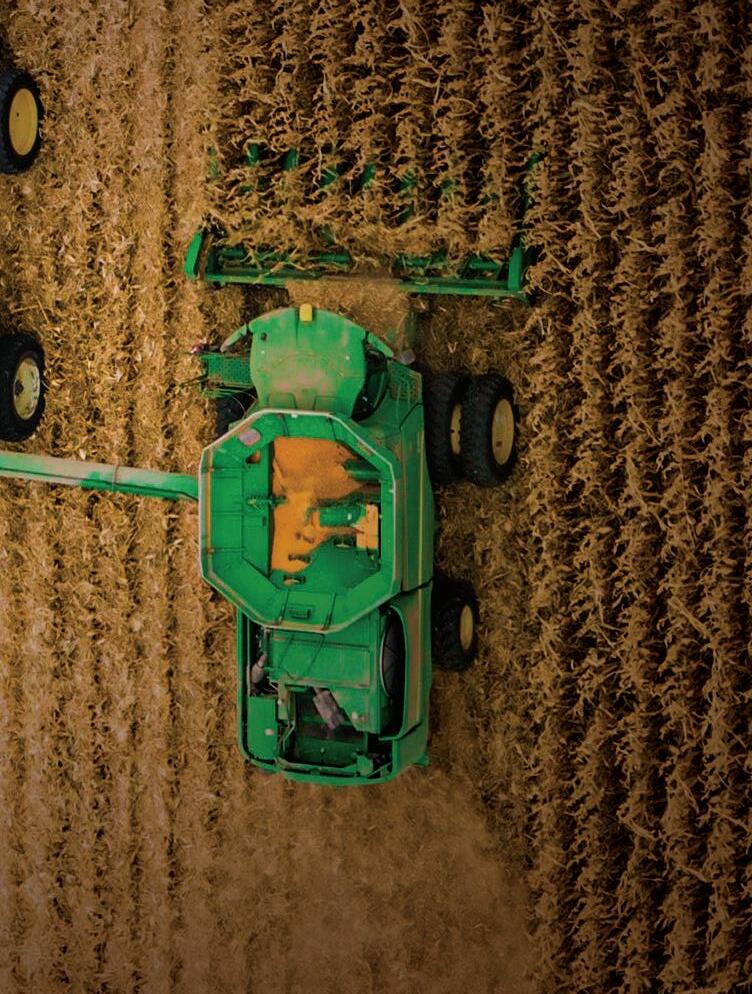

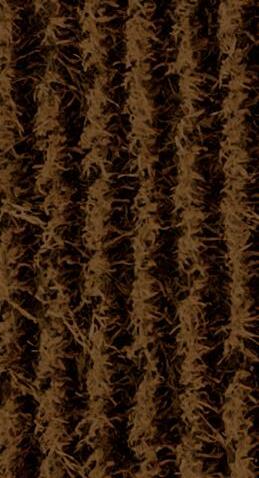






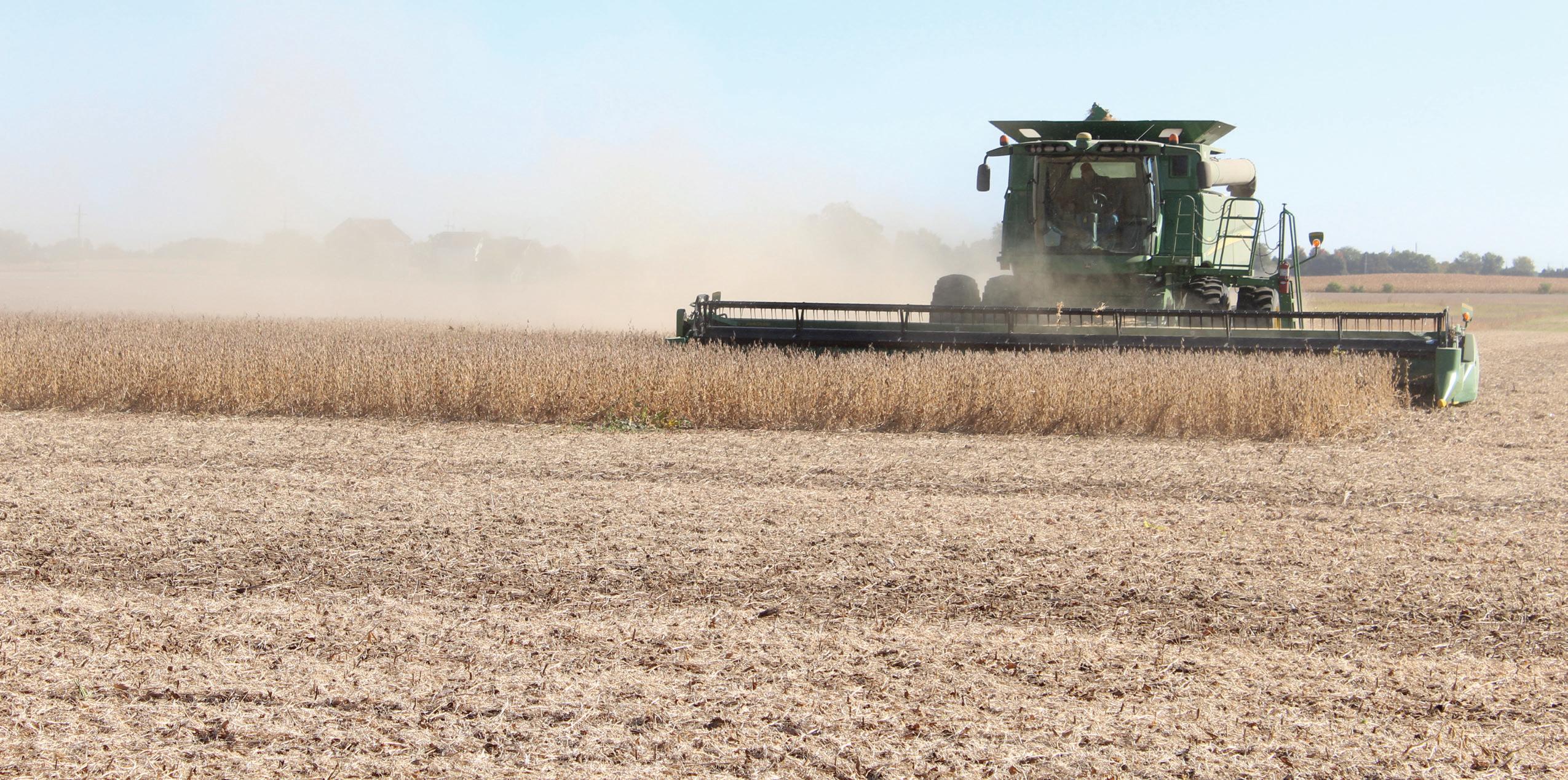
By: Martha Blum • mblum@shawmedia.com
Warm, dry weather is helping farmers in northern Illinois to quickly harvest corn and soybeans with little need to run the crops through a dryer prior to storage.
“Our soybean harvest has been very smooth,” said Berkeley Boehne, who together with his brother, Vaughn, raise corn, soybeans and wheat on their DeKalb County farm where they also feed pigs and operate a custom manure application business.
“We pretty much had three planting windows for corn and soybeans and we were able to get the first two plantings of soybeans cut,” Boehne said.
“We were waiting for the last 500 acres to finish of the late May planted beans so this is the last bean field for us,” he said on Oct. 10. “We will finish beans today and we will finish planting wheat tomorrow and these are great conditions for that, too.”
“The timing has worked out great, the soybeans are too dry, but I’ve been pleasantly surprised with the yields, but our farm usually does better on dry years,” he said. “Our beans are a little above average in the high 70s to low 80s, which is refreshing.” Boehne plants all his early corn — 103- to 109-day — first.
“We got that out before it got too dry, so we’re about a quarter done with corn,” he said. “It was 15% to 20% moisture and we dry some of that.”
Even though 16% moisture corn is nice, Boehne said, he would rather harvest corn at 18% to 20% moisture and dry it a little.
“Corn at 16% to 18% moisture is really hard to run through a dryer because it is moving so fast,” he said.
Corn yields are also above average for Boehne.
“They are ranging from 240 to 270 bushels and most of that was on manure ground, so that’s a huge part of it,” he said.
Although corn and soybean prices are
not the best, Boehne said, yield will make up for some of the shortfall.
“We have a lot of product to get consumed in a year, so we need some trade deals,” the farmer said.
“We tried non-GMO food grade beans with DeLong this year and they were a huge success,” he said. “Weed control is a little harder to manage so we use a different chemical program, but we got higher than expected yields.”
As he has been harvesting, Boehne has seen few problems with pests or weeds in his corn and soybean fields.
“It was not too dry or too wet to cause problems. We had our Pioneer customer appreciate dinner in September and they said there were no concerns,” Boehne said.
“The standability and the test weights for corn have been great,” he said. “We do full starter on our corn and full fungicide on our corn and beans.”
There have been a few combine fires in the area.
“We had a combine fire in 2016 and we won’t forget that one,” Boehne said. “Vaughn was combining corn, the hydraulic pump burned up and the combine was fully engulfed in less than two minutes.”
The farmers tried to get the GPS components out of the combine cab, but the fire spread too quickly.
“The combine was a total loss,” Boehne said. “With the wet harvest, 2016 was a rough year.”
The brothers are about two weeks ahead of schedule with their manure applications.
“We finished the applications on the seed corn acres on Oct. 4 and we’re about done with our personal manure applications,” Boehne said.
“For our late summer manure application, we did tests with the nitrogen stabilizer, Instinct, on almost 400 acres,” he said.
“We want to be able to lower our manure application rates and spread it on more acres. We left some checks to compare so we’re excited about that.”
Tillage work has started on the Boehne farm.
“We have a couple of part-time guys that do tillage work and this year we’re transitioning back to a little more deep tillage because we’re not seeing good weed control on waterhemp,” the farmer said. “Since it’s a drier year, we have the opportunity to do that.”
Most of the bean stubble ground on the farm will get an application of manure. “It will probably be chisel plowed or vertical tilled, depending on the field,” Boehne said. “We no-tilled all our wheat into soybean stubble.”
Boehne plans to knife in anhydrous on about a quarter of the acres.
“We’re trying to get away from summer sidedressing because we’ve got enough other things going on,” he said.
“If we put manure on a field, we don’t sidedress in the summer because we consider the manure as our long-term release nitrogen.”
If it stays dry, Boehne will work down some ground for spring prep so he can plant right into the stale seedbed.
“That gives us some flexibility for no-till soybeans,” he said. “Even for corn, we did a little bit of that this year and I really enjoyed it.”
With less than ideal conditions, a lot of damage can be done with the first pass of tillage in the spring, Boehne said.
“The stale seedbed really saved us this year, because during the last planting window, it never dried out,” he said.
“We didn’t have frost so that messed up the ground, but we were able to plant right into those fields.”












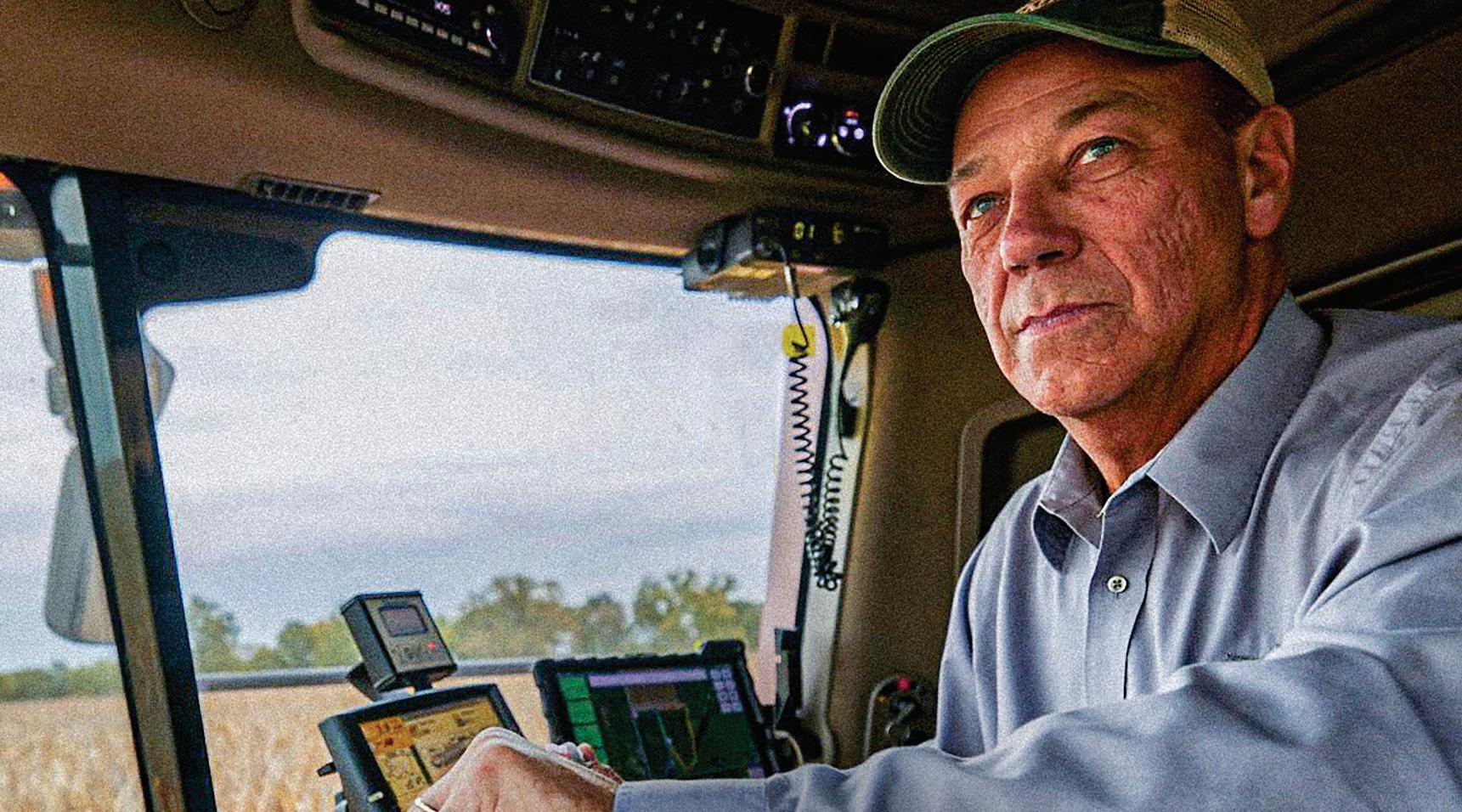









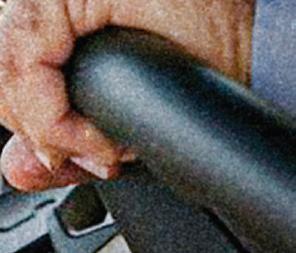





















































Every choice makes a difference in your season. That’s why those pushing themselves to be the best choose DEKALB® brand corn. Featuring a powerful combination of cutting-edge innovation and yield potential farmers feel like they can rely on. All to help ensure you never settle for anything less than the best. DEKALB.com



















Bayer is a member of Excellence Through Stewardship® (ETS). Bayer products are commercialized in accordance with ETS Product Launch Stewardship Guidance, and in compliance with Bayer’s Policy for Commercialization of Biotechnology-Derived Plant Products in Commodity Crops. Commercialized products have been approved for import into key export markets with functioning regulatory systems. Any crop or material produced from this product can only be exported to, or used, processed or sold in, countries where all necessary regulatory approvals have been granted. It is a violation of national and international law to move materials containing biotech traits across boundaries into nations where import is not permitted. Growers should talk to their grain handler or product purchaser to confirm their buying position for this product. Excellence Through Stewardship® is a registered trademark of Excellence Through Stewardship. ALWAYS READ AND FOLLOW PESTICIDE LABEL DIRECTIONS. FOR CORN, EACH ACCELERON® SEED APPLIED SOLUTIONS OFFERING is a combination of separate individually registered products containing the active ingredients: BASIC plus Poncho®/VOTiVO® O ering for corn: metalaxyl, ethaboxam, prothioconazole, fluoxastrobin, clothianidin and Bacillus firmus I-1582. ELITE plus Poncho®/VOTiVO® O ering for corn: metalaxyl, ethaboxam, clothianidin and Bacillus firmus I-1582; prothioconazole and fluoxastrobin at rates that suppress additional diseases. BASIC O ering for corn: metalaxyl, prothioconazole, fluoxastrobin, ethaboxam and clothianidin. ELITE O ering for corn: metalaxyl, ethaboxam and clothianidin; and prothioconazole and fluoxastrobin at rates that suppress additional diseases. BioRise® Corn O ering is the on-seed application of BioRise® 360 ST. BioRise® Corn O ering is included seamlessly across o erings on all class of 2017 and newer products. The distribution, sale, or use of an unregistered pesticide is a violation of federal and/or state law and is strictly prohibited. Not all products are approved in all states. Bt products may not yet be registered in all states. Check with your seed brand representative for the registration status in your state. IMPORTANT IRM INFORMATION: Certain products are sold as RIB Complete® corn blend products, and do not require the planting of a structured refuge except in the Cotton-Growing Area where corn earworm is a significant pest. Products sold without refuge in the bag (non-RIB Complete®) require the planting of a structured refuge. See the IRM/Grower Guide for additional information. Always read and follow IRM requirements. Roundup Ready® 2 contains genes that confer tolerance to glyphosate. Glyphosate will kill crops that are not tolerant to glyphosate. Poncho® and VOTiVO® are registered trademarks of BASF Corporation. Respect the Refuge and Corn Design® and Respect the Refuge® are registered trademarks of National Corn Growers Association. Acceleron®, Bayer, Bayer Cross, BioRise®, DEKALB and Design®, DEKALB®, RIB Complete®, Roundup Ready® and VT Double PRO® are registered trademarks of Bayer Group. ©2024 Bayer Group. All Rights Reserved.









By: Jeannine Otto • jotto@shawmedia.com
Cabbages are not exactly the typical big university landscaping, but at Northern Illinois University, cabbages — along with cauliflower, beets, tomatoes, peppers and other vegetables, fruits and herbs — are the first step in what could be a food revolution.
“We are taking over green spaces all over campus,” said Bryan Flower, the director of the Edible Campus project, a multifaceted program that aims to not only nourish students’ bodies with fresh, campus-grown food, but also their minds, by educating them on food production and sustainability.
The first step in the Edible Campus program were the raised beds scattered around campus. Beds of cabbage plants, tomatoes, peppers, herbs and even flowers are the “free to pick areas.”
“We have 100 free to pick areas. That’s for anybody, community members, faculty, staff, students, free to pick for anybody,” Flower said.
Flower came up with the Edible Campus program based on his extensive career as a chef in the hospitality food service industry.
Before he entered institutional food service, Flower traveled the globe as a chef, working for Hilton International.
He started at NIU in 2014 as food systems laboratory coordinator and in 2020 was named associate director of food systems innovation.
One of the first things Flower found was that the options for NIU’s dining halls, as far as food purchases, were limited to sources not usually local.
“As a state university, we are mandated by the state as to who we can purchase our products from. Unfortunately, that doesn’t allow us much scope to purchase from our local farmers and support our local farmers,” he said.
As a chef used to choosing and preparing the finest, freshest ingredients for luxury hotels, that didn’t seem right.
“It’s important for me to know where my food comes from,” Flower said.
The solution was to find a way to produce fresh food on the NIU campus itself. In 2023, a grant from the Small Business

Administration via the office of Sen. Dick Durbin provided the seed money for the first steps of the Edible Campus project.
Since then, Edible Campus has surged forward with multiple projects producing food for students and the DeKalb community.
“We started out with the first 100 free to pick beds. Then we built the Anderson Market Garden, which is on a tenth of an acre. That production goes into campus dining, it goes into the Huskie Pantry, our student food pantry, it goes into our meal prep program,” Flower said.
Since it started, the Anderson Market Garden has produced over 3,000 pounds of food for campus dining, the Huskie Food Pantry and the Edible Campus meal prep program, where students are taught how prepare meals, using the fresh produce from the garden. The Edible Campus has added a hoophouse and a composting site.
The program is collaborating with ComEd and the Electrical Power and Research Institute on the HydroPod, a 325-foot vertical farming system. The HydroPod is being used to produce seedlings, as well as hydroponically-grown leafy greens and herbs.
As the unit produces produce, it is also being used as part of a research project, measuring the electricity and impact of vertical farming systems.
Another donor donated $150,000 to build a 24- by 48-foot greenhouse that will also supply seedlings for the campus beds and the market garden.
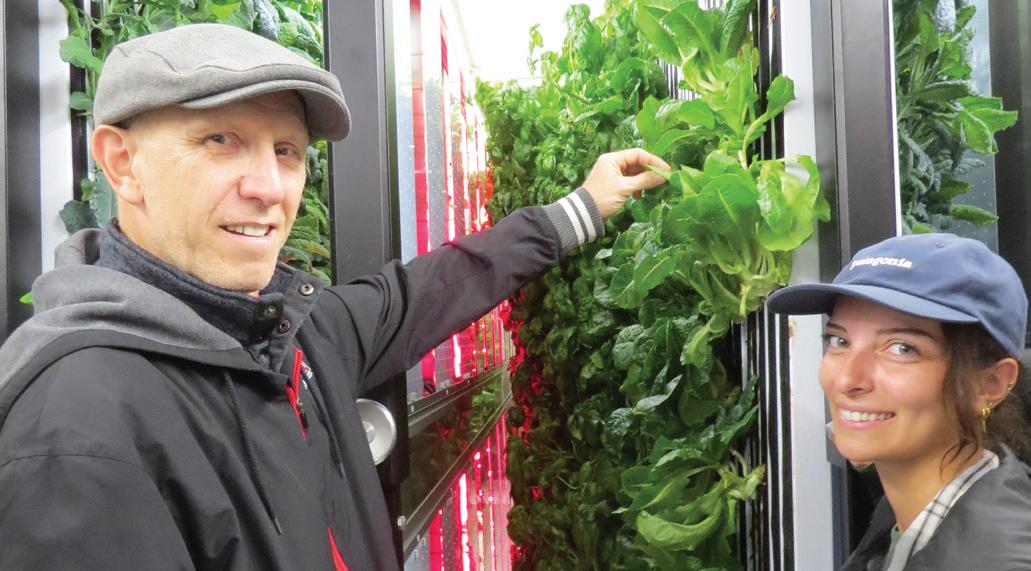
Bryan Flower, director of the Northern Illinois University Edible Campus program and associate director of food systems innovation at NIU, and Laura Fehling, program coordinator for the Edible Campus program, said the HydroPod, a vertical farming system that can be controlled by phone or laptop computer, can produce 5,000 pounds of leafy greens a year.
Flower said the program has received nothing but support on all levels, from NIU administration to the local business community and the broader business community.
“We were very fortunate. Once we got it started, the proof of concept, once we got it up and running, people realized how important this could be for the university and we got a lot of support,” he said.
The program doesn’t just feed students’ bodies. It also feeds their knowledge and builds job skills.
The program employs student workers along with graduate assistants and volunteers. NIU students, faculty and staff, along with community members, round out the workforce who help plant, tend, care for and harvest and process the produce throughout the year.
The Edible Campus program also works with local high school agriculture education programs and FFA chapters to raise seedlings for the HydroPod and the market garden.
“It’s interesting that the students we attract, as workers and as volunteers, come from different majors and backgrounds. What they have in common is this passion in gardening and food and sustainability,” said Laura Fehling, who was hired earlier this year as the program coordinator for the Edible Campus program.
With the program up and running and successful, Flower has his eye on growth.
“We are working on a grant with our sustainability office and that grant will allow us to plant more trees on campus. We are looking to build a food forest out there. The goal is to take over as much green space as possible and grow food in it, as opposed to annual plants or landscaping,” he said.
Flower also has his eye on acreage on the university’s west campus. “We hope that we can take over a 20-acre to 30-acre piece on our west campus and truly start to grow at scale regeneratively, including some livestock,” he said.
Flower has a larger, long-term goal in mind, one that started when he set out to get more locally grown food to NIU students and the community.
“If we could grow 150,000 to 200,000 pounds of food, that would meet what we are looking to achieve, which is that 20% to 25% of all food consumed comes from right here on campus,” he said.

Bryan Flower’s career in food service has taken him around the globe. Born in England and raised in South Africa, his career brought him to the United States, where he is now the assistant director for food systems innovation at Northern Illinois University and he leads the Edible Campus project. Flower and his wife also own and operate Red Home Farm, where they raise grass-fed livestock and poultry.
By: Jeannine Otto • jotto@shawmedia.com
Chef Bryan Flower hurries toward one of the raised “free to pick” vegetable, flower and herb beds that flank Neptune North residence and dining hall on the Northern Illinois University campus in DeKalb.
“What you’ll see now is mostly herbs. There’s some beautiful fresh sage,” he said, pinching off a few and crushing the silvery-green leaves between his fingers.
“You’ve got some beautiful sage and then some celery. I love sage, especially at Thanksgiving.”
Flower steps over to another bed, where some tomato plants still offer a late-season crop.
“Here, taste this. A lot of people don’t realize that is after a frost is when you get the most tasty items. It concentrates the sugars. The kids just love these to death,” he said, offering his guest some ripe, sweet cherry tomatoes.
If someone meeting Flower on the NIU campus can’t quite envision him as an electrician, working deep in the smoke and steam of a massive steel mill in South Africa, well, Flower couldn’t see himself doing that either.
Flower was born in England and raised in South Africa. He started out not in food service, but as an electrician.
“I was a qualified electrician when I was 19 in South Africa. I was in a few different places. I was working for a steel mill and I didn’t really like it,” he said.
He left the steel mill and went to work for Xerox Corp. Deciding that wasn’t a fit, he left South Africa and his career as an electrician to enter the world of food service.
Going to work in food service for Hilton International has taken Flower all over the world.
“I ended up coming to the United States a few times, not to work, but to visit,” he said.
Flower was offered an opportunity to work in the United States and decided to make it his home. He worked in the hospitality food service sector, working in hotels and casinos.
His work brought him to Chicago, where he started his career in higher education and institutional food service at Robert Morris University.
Flower was culinary instructor and then associate dean of the university’s School of Culinary Arts and Hospitality.
“That’s where I met my wife,” he said.
Flower earned his master’s degree at Robert Morris University and in 2014 started his career at NIU in the position of food systems laboratory coordinator.

Agriculture plays a vital role in our economy. With quality instructors and state-of-the-art facilities, Kishwaukee College is training the next generation to meet the changing demands of the agriculture business.

In August 2020, Flower was named associate director of food systems innovation. The NIU Edible Campus program started in 2023 with a federal Small Business Association congressional funding grant through Sen. Dick Durbin’s office.
Flower’s wife’s family lives in the area. A wish to be closer to her family prompted the couple to purchase 12 acres of land south of DeKalb.
When it comes to food production, Flower’s passion for sustainability extends from campus to his own table.
“I am a trained farmer on YouTube University,” he joked.
Their Red Home Farm started out with chickens and then moved on to larger livestock.
“We still have cattle, pigs in the summer, egg-laying chickens, goats,” he said.
When it comes to his own farm, Flower practices what he preaches on sustainability.
“We raise our animals regeneratively, so they are grass fed, grass finished, pasture raised. We don’t feed them any grain. It’s all part of knowing where our food comes from and being very diligent in that process,” he said.
Flower’s decades-long career as a chef and in foodservice influences his work at NIU and in his own home kitchen.
“As a chef, it’s very important for me to know where my food comes from, where my ingredients come from. That is part of what we are trying to do here at the university,” he said.

AG-RELATED DEGREE PROGRAMS
• Agribusiness
• Agriculture
• Diesel Power Technology
• Horticulture
• Pre-Veterinary
AG-RELATED CERTIFICATES
• Advanced Welding Technology
• Basic Welding Technology
• Cannabis & Hemp Cultivation
• Diesel Power/Equipment Repair
• Floral Horticulture
• Foundations of Agribusiness

• Foundations in Horticulture
• Greenhouse/Garden Center
• Landscape Design/Construction
AG-RELATED SHORT-TERM TRAINING
• Truck Driver Training
• Veterinary Assistant

Helping you create the life you want. PLANT THE SEEDS OF YOUR SUCCESS AT KISH.
To learn more about Kish’s many agriculturerelated programs, visit kish.edu.

By: Jeannine Otto • jotto@shawmedia.com
If you’re waiting for water, then the weather outlook headed into the first weeks of November will be good news. But if you’re ready to break out the cold weather gear, you may have to wait a while.
“At least for the first part of the winter, I don’t see any of that brutally cold air coming down into the states,” said Logan Bundy, a Ph.D. candidate at Northern Illinois University and a meteorologist with Everstream Analytics.
But while warmer than normal temperatures are likely to stick around, some relief is on the way for drought-affected areas of northern Illinois and the rest of the Midwest.
“Over the next two weeks, precipitation prospects do look much better than they have over the past couple of months,” Bundy said.
Trent Ford, the Illinois state climatologist, agreed.
“The outlook for the near term, for the next two weeks, it’s going to be wetter, that’s the big thing,” he said.
Both Bundy and Ford said that a more active pattern will develop over northern Illinois that is likely to produce widespread rainfall, bringing relief to areas of the state that haven’t seen substantial rain in weeks.
“Totals around the upper Midwest and northern Illinois, over the next couple of weeks, could range in the 3 to maybe 4-inch range. It’s definitely a much more active pattern ahead, starting on Halloween and going forward,” Bundy said.
That pattern will be different from previous systems that saw sudden, heavy, isolated downpours.
“This is not a convective system where we get pop-up thunderstorms and someone gets two inches of rain and someone gets nothing. This is a low- pressure system that’s going to bring widespread rain across the state of Illinois,” Ford said.
He added that longer-term models suggest that more active pattern could stick around.
That is good news for river and stream levels, especially on major waterways like the Mississippi River, as well as tributaries like the Fox River, Kishwaukee River and Rock River.
“Even the two-week outlook is still 50% to 60% chance of above-average precipitation. That is telling us that this low-
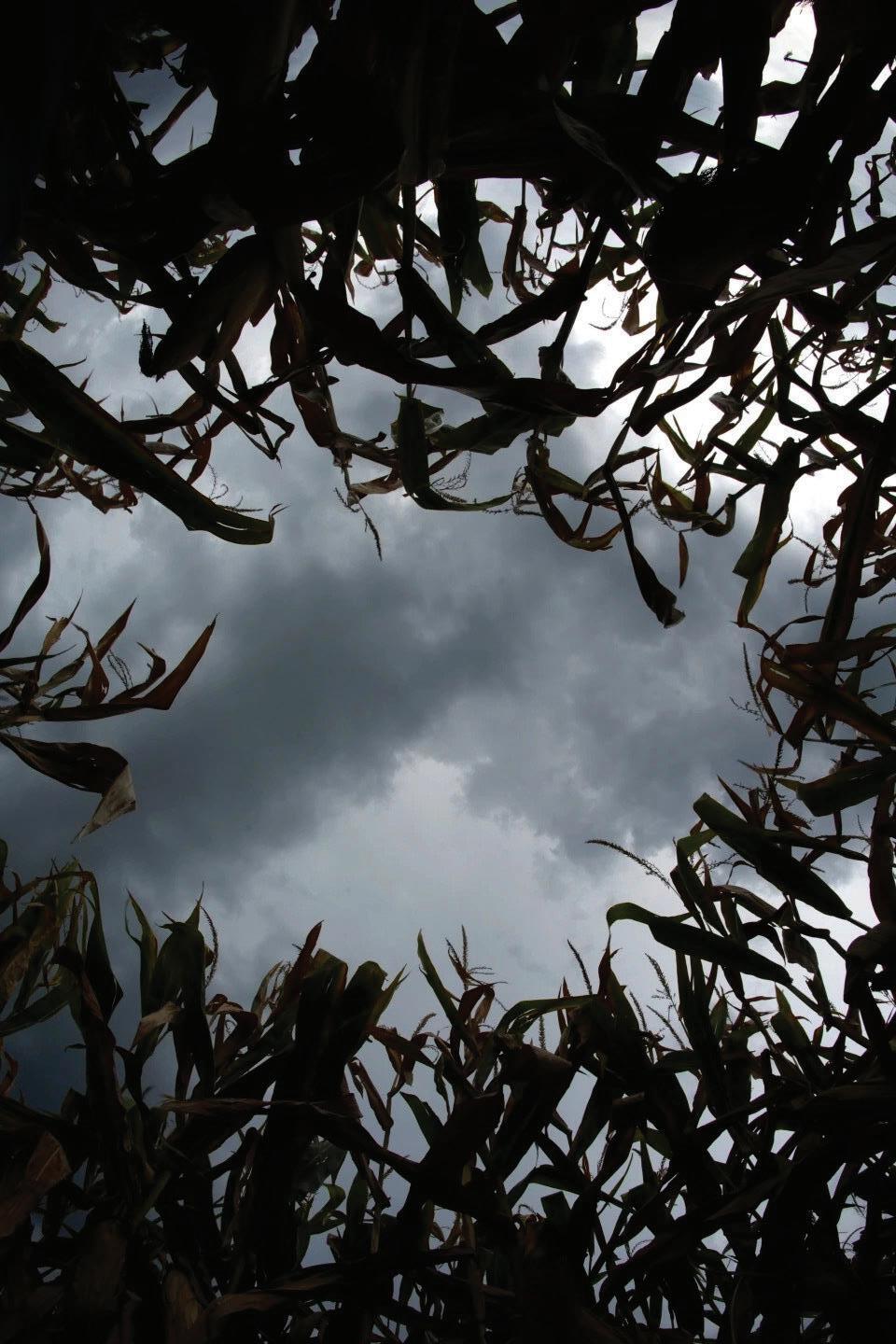
AP photo/Charlie Riedel
Storm clouds build above a cornfield. A more active weather pattern is expected to develop over northern Illinois in the near term that is likely to produce widespread rainfall, bringing relief to an area that hasn’t seen substantial rain in weeks.

pressure system that is moving through the central region is likely going to persist so we will likely see more active precipitation,” Ford said.
“We may not see another two inches, but more active rainfall, which is good. What we need is not just one wet week, but several wet weeks to really climb out of the drought.”
Bundy said that weather models also suggest the possibility of La Niña, a weather pattern marked by cooler than normal sea surface temperatures in the equatorial Pacific Ocean.
The pattern typically brings drier than normal autumns and wetter than normal winters to the Midwest.
Using La Niña trends along with Midwest winter temperature trends, Bundy said winter could start off mild.
“I think this winter there is a higher probability that temperatures for northern Illinois and the broader Midwest will be on the warmer side, just like they have been over the past few winters. With a La Niña developing, that tends to favor a warmer winter for the Midwest,” he said.
By: Jeannine Otto • jotto@shawmedia.com
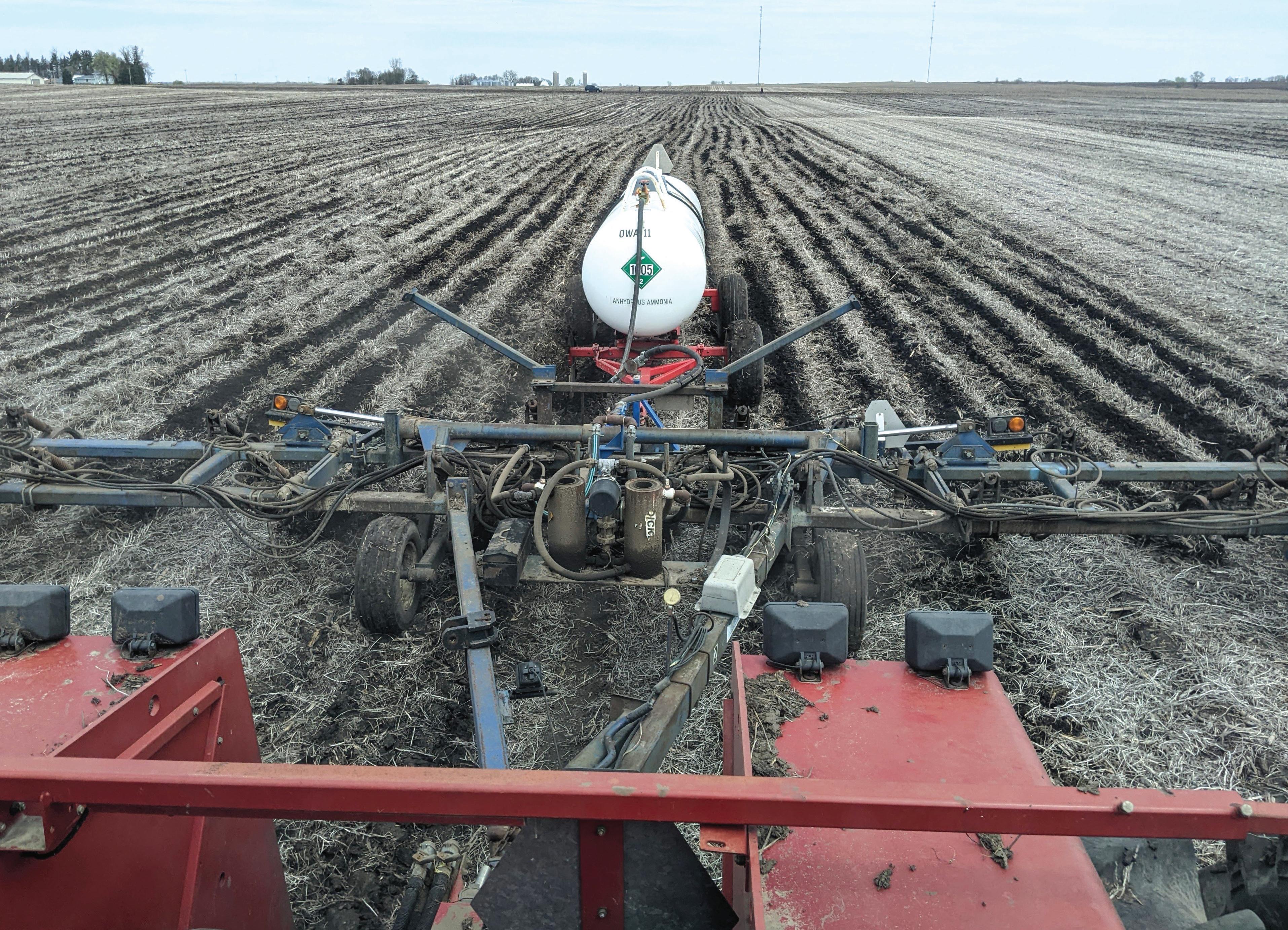
While the extended dry, warm fall has made harvest of corn and soybeans smoother for farmers, it also means farmers might have to put the brakes on when it comes to fall fertilizer applications.
“For the most part, they are happy with the warm, mild temperatures. It has made it pretty comfortable to be out there,” said Jim Donnelly, technical agronomist with DEKALB brand corn and Asgrow brand soybeans, based in northern Illinois.
The 4R Nutrient Stewardship framework — which provides guidelines on the right source, right rate, right placement and right time for farm nutrient applications — advises waiting to apply fall nitrogen until maximum daily soil temperatures at the 4-inch level fall to 50 degrees and temperatures are forecast to steadily decline.
“The biggest thing is nutrient application. Ammonia application is first and foremost the biggest concern that we have, as far as not putting nitrogen out there too soon because the soil temperatures are still so warm,” Donnelly said.
The dryness of soils also can impact fall nitrogen applications.
“From a dryness standpoint, make sure we’re not putting ammonia in dry soils as that will lead to unstable nitrogen, as well,” Donnelly said.
For farmers applying fall nitrogen, a nitrogen stabilizer is recommended.
“With as warm as it’s been, we 100% recommend stabilizer on ammonia and, frankly, we encourage stabilizers for any fall application,” the agronomist said.
Donnelly also added a caution for those farmers who plan to do soil tests.
“Most agronomists will recommend semi-frequent soil testing, usually once every four years. Sampling in the fall can sometimes lead to misleading results when you have a dry fall. Extremely dry soils can lead to erroneous potassium levels and sometimes pH levels,” he said.
“I urge caution when interpreting some of those results when they are taken under dry conditions. Potassium is one in particular that can show much lower levels than what is actually present, just
Unless rain in the forecast is going to keep you out of the field for a long while, it is often wise to wait a little longer after your soil reaches 50 degrees before applying anhydrous because chances are that temperatures will warm back up again.
due to soil moisture, or lack thereof.”
Overall, fall harvest in northern Illinois has been helped by extended warm and dry weather, which helped farmers in the field and at the grain dryer.
“It has been incredibly less stressful because of a seemingly and what has ended up to be a wide-open calendar. There were just no hints of rain on the horizon and no need to rush,” Donnelly said.
“The corn was very dry and it’s just so much easier to handle that volume when it’s so dry. We can debate whether it’s a good thing to have corn that dry or not from a yield standpoint, but logistically it sure did make things quite a bit easier.”
He said substantial yields on corn helped to ease a little of the anxiety that farmers had going into the 2024 harvest.
“I think we went into harvest a little anxious just from a financial situation. Not that we still aren’t, but the yields have certainly helped ease some of that anxiety — and that’s a positive,” he said.




that’s about the stories of your life, Imagine a bank and not just about transactions. We’re here to help you achieve the story of your life. We bring neighbors and local businesses together to help you thrive.




DEKALB 913 S. Fourth St. 815-756-1444 GENOA 327 W. Main St. 815-784-5101
SANDWICH 200 E. Church St. 815-786-2115 SOMONAUK 128 Depot St. 815-498-2396 SYCAMORE 124 S. Main St. 815-756-1444 SYCAMORE 1985 DeKalb Ave. 815-756-1444
















